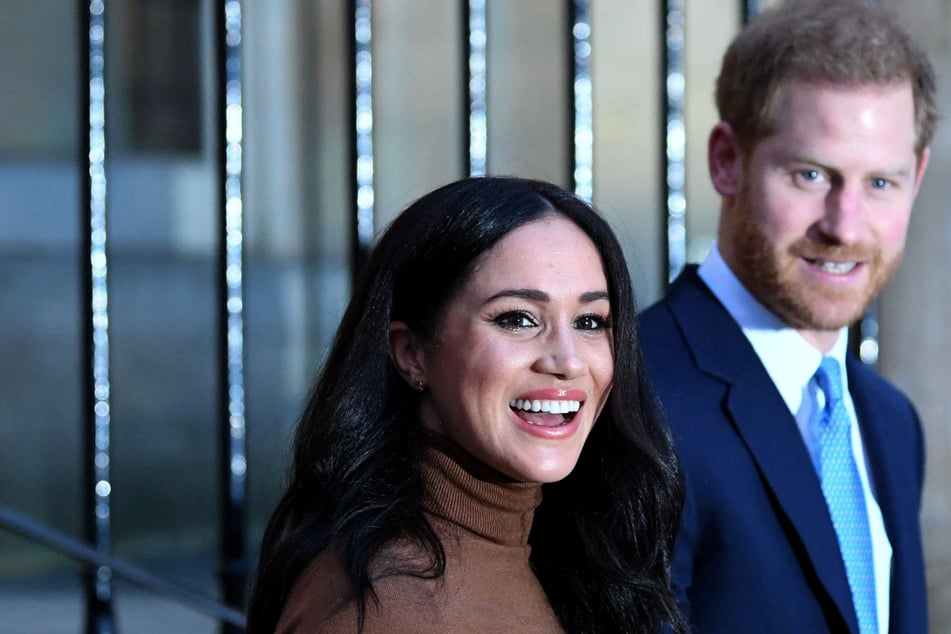A new wave of speculation is sweeping through the royal circles as revelations from British media insiders Angela Levin and Dan Wooten suggest that Meghan Markle and Prince Harry might be heading towards divorce.
This shocking news has sent ripples through both the royal family and the public, igniting a flurry of questions about the couple’s future, their children, and the broader implications for the monarchy.
Levin, a well-known royal biographer, and Wooten, a tabloid journalist famed for his sensational stories, have emerged as key sources in this unfolding drama.
Their claims are not mere gossip; they assert that they possess credible insider information about the couple’s strained marriage.
The evidence they present paints a troubling picture of a relationship that has faced increasing challenges since Meghan and Harry stepped back from their royal roles.
In interviews, Levin has openly discussed the pressures that royal life imposed on the couple.
She highlights the relentless public scrutiny, the media frenzy, and the difficulties of raising two young children under such intense observation.
Wooten corroborates her insights, noting that their transition to life in America has been anything but smooth, resulting in professional setbacks and personal conflicts.
As the narrative develops, observers point to the couple’s public appearances, where their body language seems telling.
Once the epitome of romance, Meghan and Harry now appear more like co-parents than partners, with moments during events suggesting a scripted performance rather than genuine connection.
This raises pressing questions about the authenticity of their relationship and whether reconciliation is even possible.
Their decision to step away from royal duties back in early 2020 was celebrated as a bold move.
However, this choice has led to a cascade of unforeseen complications.
Initially, they envisioned a life filled with independence and charitable endeavors, but reality soon delivered a harsh lesson.
The financial burdens of maintaining their lifestyle, combined with constant media attention, have created a perfect storm of stress.
The implications of their potential separation extend beyond just the couple.
Their children, Archie and Lilibet, are at the heart of this evolving story.
As parents, Meghan and Harry are reportedly committed to ensuring a stable environment for their kids, leading to discussions about co-parenting arrangements that prioritize their children’s well-being, despite their differences.
Public reactions to this news have been mixed.
Some express sympathy for the couple, acknowledging the immense pressures they face in the spotlight.
Others, however, view them as symbols of privilege struggling to cope with the consequences of their decisions.
Social media is buzzing with opinions, memes, and commentary, reflecting the public’s fascination with the couple’s tumultuous journey.
When Meghan and Harry stepped back from royal life, they anticipated a fresh start.
However, they quickly discovered the harsh realities of financial independence.
Having enjoyed the benefits of royal funding, they now faced the daunting task of establishing new income streams to support their lifestyle.
Their move to California, initially seen as an escape from media scrutiny, soon revealed the high cost of living and the financial strain of maintaining their sprawling estate in Montecito.
With a purchase price around $14.7 million, the upkeep of such a luxurious home has added to the pressure to generate income.
To offset these costs, the couple sought lucrative deals with major companies like Netflix and Spotify, hoping to create content that would provide financial stability while allowing them to pursue their passions.
However, the pressure to deliver compelling projects has only intensified the scrutiny they face, especially as they navigate their new identities outside of royal life.
Additionally, their philanthropic efforts through their organization, Archwell, require significant funding, further complicating their financial landscape.
Critics have pointed out the irony of their financial ventures, questioning the authenticity of their calls for privacy while profiting from public interest.
As they grapple with these financial challenges, the emotional toll on their relationship cannot be overlooked.
The stress of managing finances, coupled with public scrutiny and parenting responsibilities, has created an environment ripe for conflict.
Levin and Wooten suggest that differing approaches to these pressures may have widened the rift between them.
The complex web of financial and emotional pressures facing Meghan Markle and Prince Harry continues to evolve.
As they strive to establish their new identity away from royal expectations, the impact of these challenges is felt both personally and professionally.
The lingering question remains: can they find a way to balance their ambitions and their relationship, or will these strains lead to further turmoil in their already complicated narrative?










